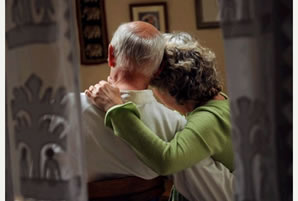Early Dementia Diagnosis 'Vital' Says West Mid
Awareness Week will highlight the condition
Dementia is the biggest health crisis facing the UK with one in three of us likely to be diagnosed with the illlness which is linked to decline in the brain. Across Ealing, Hammersmith & Fulham and Hounslow, it is estimated 6,046 people have dementia in 2014. By 2020, the number of cases is expected to rise to 7,004.
According to figures, there are currently 665,065 people in England who have dementia and an estimated twenty one million people have a close friend or family member living with the condition
Dementia Awareness Week takes place between 18 and 24 May. West Middlesex University Hospital will be raising awareness about the condition which affects around 800,000 people in the UK. And the Alzheimers's Society is advising people not to "bottle up" their fears and to ask for help.
West London Mental Health NHS Trust is backing a new Dementia Friends campaign, aimed at helping people develop a greater understanding of dementia and supporting those living with the condition. Dementia usually occurs in people over the age of 65, and with aging population, we are likely to see a rise in the number of people with dementia. Early diagnosis can help people with dementia get the right treatment to slow it down and maintain mental function, as well as help relatives to prepare and plan for the future.
On Monday 19 and Friday 23 May the hospital’s Care of the Elderly and Adult Liaison Psychiatry teams will be in the main atrium of West Middlesex Hospital between 10.00am and 3.00pm to raise awareness and provide advice to patients, visitors and staff about dementia. They will also be joined by local voluntary services such as the Alzheimer’s society and Integrated Neurological Services (INS).
Information will also be available about extra support that is provided by the hospital and local community, such as the Dementia Carer’s Support Group.
Dementia is a syndrome (a group of related symptoms) associated with an ongoing decline of the brain and its abilities. This includes problems with:
• memory loss
• thinking speed
• mental agility
• language
• understanding
• judgement
Consultant in care of the elderly and stroke medicine, Dr Ravneeta Singh said: “A large proportion of people with dementia go undiagnosed because people are unaware of the condition and what can be done to manage it. At any given time around half of all inpatients at the hospital will be older people, aged 75 and above, and we would typically expect half of these to have dementia/delirium or both.
All patients over 75 years old are screened for dementia and delirium (a condition of acute confusion which those with dementia are highly susceptible) when they are admitted to hospital. This helps to devise an appropriate care plan during their stay and after discharge from the hospital.
The hospital’s Crane Ward was refurbished in 2013 to be a dementia-friendly ward, thanks to a £99,000 grant from the Department of Health and £10,000 from Bouygues Energies & Services. Since its reopening in December last year, the changes have already shown noticeable improvements in patients’ wellbeing.
Dementia Friends is an Alzheimer’s Society initiative launched in 2013 aimed at increasing understanding and awareness of the condition. The new campaign aims to raise awareness and help create a network of one million Dementia Friends across England by 2015. As part of the campaign, adverts will appear on TV and online to raise awareness.
For further information on the campaign and how to become a Dementia Friend, please visit www.dementiafriends.org.uk
May 16, 2014
Related links
|
